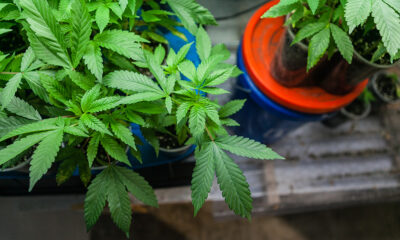
Medical
Study: Italians Stopped Using Pharmaceuticals When CBD Became Available
A law that “accidentally” allowed “light cannabis” sales in the country meant fewer people used prescription drugs.
In December 2016, lawmakers in Italy legalized industrial hemp. Farmers in the country could cultivate and sell varieties of the cannabis sativa plant — provided that the plants contained no more than 0.2 percent THC.
The law was in many ways a return to the past: In the 1940s, during World War II, Italy (an Axis ally of Nazi Germany) was the world’s second-largest producer of industrial hemp, a crop that the ancient Romans grew on an industrial scale. Left unchanged were country-wide prohibitions on smoking cannabis sativa and whether the plant product in question was a piece of rope or an underground-market bag of U.K. Cheese that could compete for shelf space at a recreational dispensary in the United States.
About 2,000 businesses growing 4,000 hectares of hemp sprung up. Non-farming Italians responded by growing, selling — and smoking — lots of cannabis. In this case, what Italians lit up and inhaled was “cannabis light,” the term used in the country for cannabis flower with 0.2 percent THC, which became available in every corner of the country for about 8 to 10 euro per gram. (Another way to describe this, that might resonate in a CBD-mad North America: high-CBD cannabis.) And while doing this, Italians also started buying less and less pharmaceutical drugs — so much less that it’s drawn the attention of researchers.
The “unintended consequence” of legalizing cannabis “uncommonly rich” in CBD in Italy — available legally even to adolescents and youths who could not buy tobacco —became known as “do-it-yourself medicine,” as a trio of researchers who published their findings through York University in the United Kingdom found.
Where light cannabis was available, prescriptions of “opioids, anxiolytics, sedatives, anti-migraines, antiepileptics, anti-depressives and anti-psychotics” all dropped.
Where light cannabis was available, prescriptions of “opioids, anxiolytics, sedatives, anti-migraines, antiepileptics, anti-depressives and anti-psychotics” all dropped.
As the researchers wrote, “we find that the arrival of light cannabis in a given province led to a reduction in the number of dispensed boxes of anxiolytics by approximately 11.5%, reduction of dispensed sedatives by 10% and a reduction of dispensed anti-psychotics by 4.8%.”
Knowledge of the accidental legalization spread erratically. Areas that had hydroponic shops tended to get wise sooner, the researchers found. Eventually, by 2018, each of Italy’s 106 provinces was serviced by at least one “light cannabis retailer,” similar to the CBD-only dispensaries that popped up in Switzerland and in France over the past few years when those countries also clarified that low-THC cannabis was an acceptable commodity.
The Italian researchers note that the reduction in pharmaceutical use they noted is less pronounced than that seen in other studies, where patients cut back use of prescription drugs by as much as 20%. But keep in mind that Italy had available only low-THC cannabis — and it is increasingly accepted that THC is required to treat certain maladies, including pain and sleeplessness.
How have Italian authorities responded? By shutting it all down, of course. As the English-language Italian-news website The Local noted, a high court recently ruled that cannabis “derivatives” — a definition that includes smokable commodities like low-THC flower — are not legal under the December 2016 law. According to the court, cannabis in Italy is only legal outside of the country’s legitimate but small medical-cannabis program if the cannabis in question is “free of narcotic effects.”
It bears mentioning that the ruling coalition in the Italian government is led by the far-right Lega party, officials with which have had hard words for the country’s burgeoning cannabis retail sector. As for the Italian light-cannabis sellers? As per The Local, at least a few have promised to fight any efforts to shut down their businesses in court.
TELL US, have you tried CBD?






















